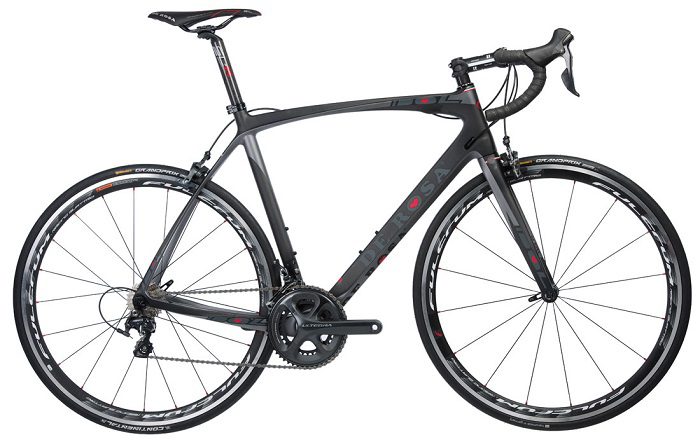Road Test: De Rosa Idol, Italian form and function
One of my first rides on the De Rosa Idol was at a weekly hammerfest. What could be a better test than a ride in which everyone is givin’er or doing everything to hang on?

One of my first rides on the De Rosa Idol was at a weekly hammerfest. What could be a better test than a ride in which everyone is givin’er or doing everything to hang on? Ahead of the ride, I really wasn’t sure how the bike would perform. On my first few runs around the block, I thought the bike was very well-behaved. It was stiff and efficient, but didn’t feel aggressive. Would it be suited to the intensity of my ride?
The De Rosa brand has a long history in road racing. Ugo De Rosa founded the company in 1953. He famously built bikes for Eddy Merckx and his Molteni team in the ’70s. De Rosa later taught Merckx how to weld and build bikes, which the Belgian rider went on to do. In Canada, the De Rosa brand has not had a strong presence the past 10 years. Logica Sport, a Montrealbased company, started bringing in the bikes this year. It didn’t take long to see De Rosas at the races. The Canadian trade team Velo Select has taken Idols to events such as the Grand Prix Cycliste de Saguenay and the Philadelphia International Cycling Classic.
The first incarnation of the Idol spanned the late ’90s and early 2000s. It was an aluminum race bike. The current version is carbon fibre and focused a little less on competition. “When they brought the Idol back a few seasons ago in the its carbon iteration, they really wanted to focus on a gran fondo-esque concept,” said Adamo Forian, sales manager at Logica. “They wanted it to be racey. They wanted it to be performance-oriented. They wanted to be snappy and responsive, but they didn’t want the bike to be exclusively for people who were going to race and compete on it. They wanted it to be comfortable on long distances, too.”
During the punchfest, the Idol held its own. For the town-line sprint, it had great power transfer, which also served me throughout the frequent surges in the group. Through fast, tight corners, it rode well. It didn’t draw attention to itself on the punchy climbs, but when I checked my data from the ride, the numbers matched those of more climby machines.
Forian, who has a background in custom frame building, points to the classic geometry of the bike for its good behaviour on the road. Both the head tube and the seat tube have an angle of 73 degrees. It’s a classic setup. Forian admits that this angle combination doesn’t work for every frame size, but in the medium-size range, say 54 cm average, it seems to be ideal for balancing your weight across the bike, and thus giving you the best comfort and control. If that’s a classic arrangement, then I must be a modern guy. I had to do a bit of adjusting on the 54.5-cm frame: I tightened things up a bit. I’m comfortable with a 100-mm stem on a 54 cm frame, but I needed a 90 mm on the Idol. I also had to move the saddle pretty far forward. With those changes dialed, I did find that comfort and control the Forian spoke of, especially on my longer rides.
The frame’s tubes do show some design flair, although not as much as some brands that come from De Rosa’s home country of Italy. The down tube has a flat leading side and a more pointed inside edge, almost like a reverse truncated airfoil. The edges of the flat side also sit slightly proud, giving the effect of trim. The seatstays are nicely bowed, while the chainstays have asymmetric curves. The design touches look good, adding a good amount of visual interest, without drawing too much attention to themselves. “Nothing is really done only for the look of it, but that doesn’t mean things have to be ugly either,” Forian said of the design. He pointed out that the wide, flat side of the down tube adds to its size and to the junction at the bottom bracket, which increase frame stiffness. The bowed seatstays offer some vertical compliance for comfort. The asymmetric chainstays improve power transfer.
The De Rosa Idol makes a great package. It will ride really well when the action is fast and hard, but it’s also a great choice when you want to go long and enjoy the roads. It also looks good no matter where you ride.
De Rosa Idol (as tested)
Components: Shimano Ultegra mechanical, 11-speed
Wheels: Fulcrum R4
Sizes: (cm) 47, 49.5, 52, 54.5, 57, 59.5
Price: $5,000 ($3,000 frame and fork)
Website:logicasport.com

